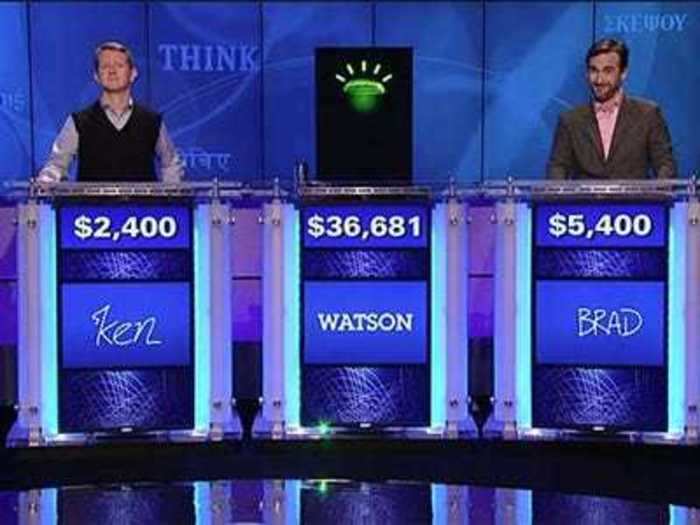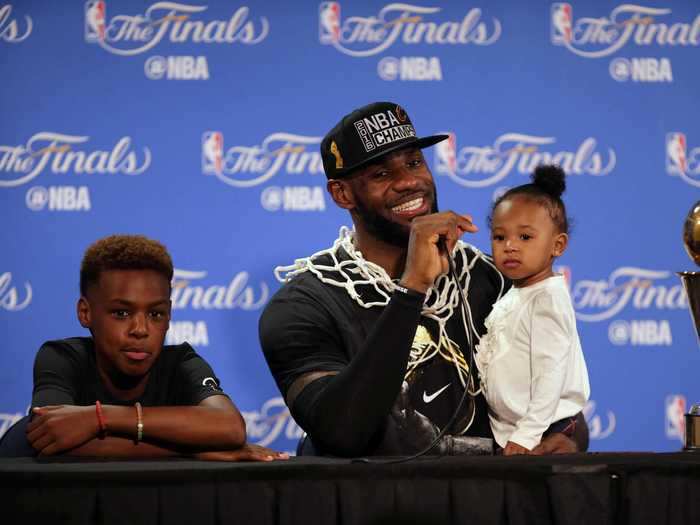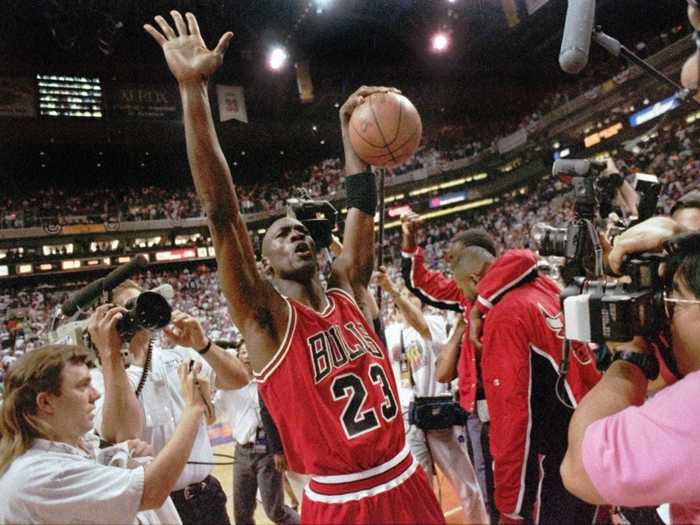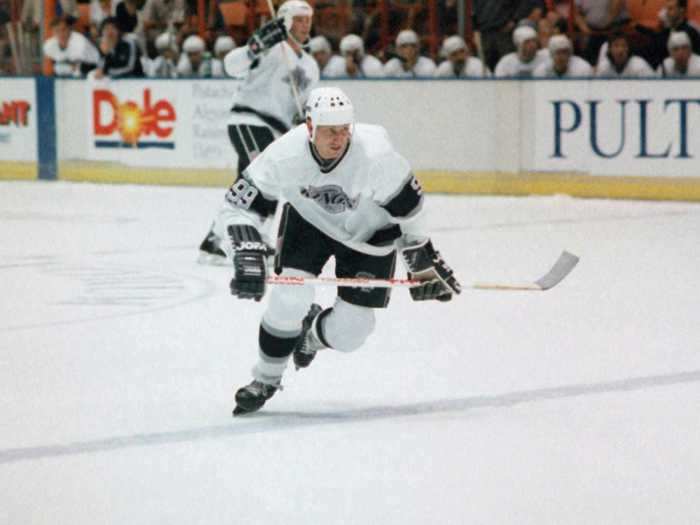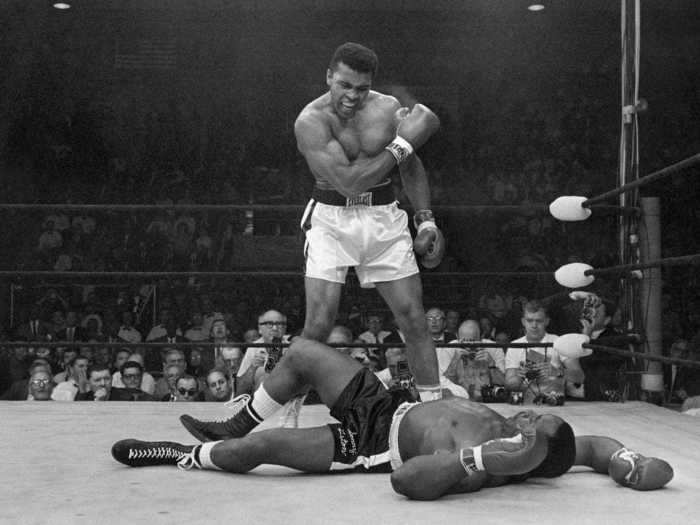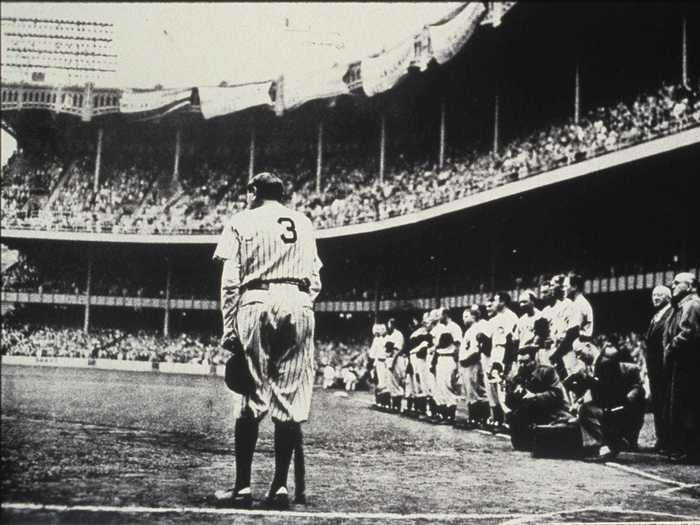Michael Jordan at the peak of his powers in the 1990s.Alan Mothner/AP
- ESPN's 10-part documentary on Michael Jordan, "The Last Dance," is an education for younger generations who never saw "the greatest basketball player of all time" play during his 1990s prime.
- Athletes calling themselves "the greatest" predates Jordan, though, most famously in the boastful words of the late boxing legend Muhammad Ali.
- The "GOAT" (as in, the "greatest of all time") term has begun to transcend sports, finding itself in the pop music world and even on game shows like "Jeopardy."
- Visit Business Insider's homepage for more stories.
Long before the crying Jordan meme, when Michael Jordan retired from professional basketball (the second time, not the third), he was widely considered "the greatest basketball player of all time."
In the years since, the "greatest" debate has intensified in the context of basketball, as LeBron James, who wears both of the heir apparent nicknames "the chosen one" and "King James," built an impressive resume that made a comparison with Jordan legitimate. Still, it rankled many in the basketball community in 2018, when James said, "That one right there made me the greatest player of all-time," in reference to his 2016 championship with the Cleveland Cavaliers.
Somewhere along the way, the phrase "greatest of all time" mutated into the acronym "GOAT," and it invaded sports fan culture, as indicated by the fallout from James' GOAT comments. You see, there can only be one GOAT, and the Michael vs. LeBron debate is growing increasingly heated as one generation's GOAT squares off against another's.
Into the fray enters "The Last Dance," an epic 10-part documentary series on Michael Jordan's 1997-98 Chicago Bulls season. It was originally scheduled to air on ESPN in June to coincide with the NBA Finals but brought forward due to the absence of other sports programming. No less an authority than Bill Simmons, best-selling basketball book author, onetime ESPN writer and current leader of Spotify-owned TheRinger.com, has floated the idea that the series is a GOAT gambit of sorts: Jordan's attempt to shore up his GOAT case against LeBron's. (Simmons should know. He reportedly liked the suggestion by his friend and colleague Chuck Klosterman that he choose "The Goat" instead of "Grantland" as the name for his now-defunct ESPN sports and pop-culture website.)
But the GOAT debate isn't limited to basketball or even athletics. You can find it increasingly far afield from barroom debates about who was better, such as this Reddit thread on who the GOAT esports athlete is. And it's even losing its status as a superlative, with some members of Gen Z using it as slang for something that's just really great.
Read on to see how far back the concept of the GOAT goes, who has worn it over the years, and how much of our culture is pervaded by GOAT-ness.
Read the original article on
Business Insider
GOATs everywhere — including Jeopardy's Ken Jennings.
Ken Jennings during one of his "Jeopardy" GOAT tournaments, against Brad Rutter and IBM's Watson.
About a decade ago, the legendary sportswriter Frank Deford noticed the prevalence of GOAT as the preferred 21st-century moniker for the greatest athlete in a particular sport.
Another wordsmith, LL Cool J, claimed to have introduced the term to hip hop with his 2000 album of the same name. "I "literally" introduced the term GOAT to hiphop with this album!!!!!! Yes LLCOOLJ started this term in Hiphop !!! In the year 2000!!! It's the truth don't be offended!!!" he tweeted in 2018, without mentioning De La Soul's prior use of the term.
—LLCOOLJ (@llcoolj)
April 24, 2018Even beloved gameshow institution "Jeopardy!" got into the act in 2019 with its GOAT tournament, pitting three record-breaking champions against each other. For now, Ken Jennings is the GOAT, holding the record for longest winning streak as a contestant and beating rivals Brad Rutter and James Holzhauer's in the aforementioned tournament.
There are early indications that Gen Z is abandoning the sports/gaming connotations of the term altogether, as Business Insider has reported that "GOAT" is that generation's slang for something that's "perfect."
The message is clear: GOATs are all around us, and GOAT is the GOAT of superlatives.
If you have additional GOAT observations, please reach out to nlichtenberg@businessinsider.com.
LeBron James, the "chosen one" to follow in Jordan's footsteps.
LeBron James celebrating his most recent championship, with the Cleveland Cavaliers in 2016.
Reuters
A basketball phenom since he was in high school, LeBron James was the most prominent of the many heirs to Jordan's legacy throughout the 2000s (with the partial exception of Kobe Bryant). A very different player to Jordan, James' finals record is far from undefeated and currently stands at 3-5. But he made the finals in eight consecutive seasons and was likely to return after a one-season absence until the sudden suspension caused by the coronavirus pandemic.
James brought a heightened level of social awareness to the heights of NBA stardom, speaking out publicly during the Trayvon Martin case and becoming extensively involved in Democratic politics.
Michael Jordan left basketball in the late 1990s as "the greatest basketball player of all time."
Jordan celebrating one of his many championships during the 1990s.
John Swart/AP
Jordan's claim to GOAT status banks heavily on his undefeated 6-0 record in NBA Finals competitions. He was simply never beaten on the biggest stage, even though he bizarrely retired for parts of two seasons in between the Chicago Bulls' separate three-peats in the 1990s.
Stories of Jordan's competitiveness were legendary, as he prevented many other stars from his generation — Charles Barkley, Patrick Ewing, Reggie Miller, to name a few — from even claiming one championship during his prime.
Jordan soon became one of the greatest pitchmen in sports history, signing a record-breaking shoe contract with Nike and becoming the global face of McDonald's, among many other brands. He was notable for not using his celebrity for political purposes, famously, and maybe apocryphally, saying at one point that "Republicans buy sneakers, too."
Wayne Gretzky, the hockey phenom known as "the great one."
Gretzky during his Hollywood heyday.
AP Photo
The 1980s was a time full of GOATs. Joe Montana laid a claim to the football GOAT title, while Wayne Gretzky was dubbed "the great one" as he rewrote hockey's record book. Gretzky's record haul is truly outstanding, even by GOAT standards. When he retired, he either held or shared 61 statistical records, many of which still stand. To give you an idea, when he broke the single-season goals record of 76, he scored a whopping 92 goals; and he still holds four of the top 10 goal-scoring seasons ever.
Gretzky almost spells "great" if you squint, and his exploits made hockey a mainstream American entertainment — or at least more than it had been. At the end of the decade, in a move surely popular with league officials, Gretzky was part of a historic trade to the Los Angeles Kings, turning Canada's national sport into a hot ticket in the heart of Hollywood.
Muhammad Ali, the self-described "greatest" boxing heavyweight champion.
Ali photographed knocking down Sonny Liston, by John Rooney of the AP.
John Rooney/AP
The boxer Muhammad Ali became closely associated with the phrase "greatest," mostly because he called himself that … a lot.
"I am the greatest," he said in 1964, after defeating Sonny Liston to become world heavyweight champion at just 22 years old. The boast wasn't a new one: the year before he had released a spoken-word album called, you guessed it, "I Am The Greatest."
Ali held onto his heavyweight title for years afterward, until 1967, when he was stripped of it for refusing to serve in the Vietnam War. His principled stance gave his stature as "the greatest" an entirely new meaning that many followers, including Michael Jordan, couldn't live up to.
Ali was also the GOAT of coining the GOAT acronym. His wife, Lonnie Ali, trademarked G.O.A.T. Inc. in 1992, the earliest known shortening of "the greatest of all time" into its modern-day synonym.
Ali's status as the inspiration for the GOAT acronym is strengthened by a crucial piece of pop-culture evidence: the 1993 song "Lovely How I Let My Mind Float," by De La Soul, in which guest rapper Biz Markie says, "I got more rhymes than Muhammad Ali." Later on the track, Trugoy the Dove says, "Lovely how I let my mind float / Now I'm-a take my b-a-a-d ass home 'cause I'm goat."
Babe Ruth, baseball's former home run king and reigning GOAT.
Babe Ruth's final appearance at Yankee Stadium in Nat Fein's Pulitzer Prize-winning photo, 1948.
Photographer: Nat Fein via Minnesota Historical Society
Other sports have found GOATs in more recent decades, but many baseball fans still consider George Herman "Babe" Ruth Jr. to be the greatest of all time. Ruth was baseball's dominant figure in the surging consumer culture of the roaring Twenties, and by the time his career ended he held two major records that would last for decades: the single-season home run record and the all-time home run record.
For years, Ruth's claim to GOATness was there in the numbers, with baseball fans widely known as the most stat-obsessed of any sport. Although Ruth's records were broken a few decades earlier, they were shattered by the explosion of offense seen during the years of the steroids scandal of the '90s and 2000s, which tarnished baseball's hallowed record books forever.
Like many fellow GOATs, Ruth had crossover mainstream appeal, as the "Baby Ruth" candy bar cashed in on his name while denying any specific connection to the struggler.
Ruth's heyday saw one of the earliest known usages of the phrase "greatest of all time," in a 1924 Vanity Fair article on the British tennis player Laurence Doherty, according to the Grammarphobia blog. The term was used decades later, in a 1956 issue of Sports Illustrated, Grammarphobia further noted, to refer to the Basque jai alai player Erdoza Menor.

